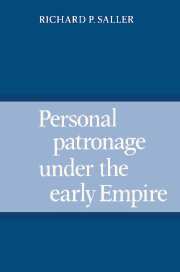Book contents
- Frontmatter
- Contents
- List of tables
- Preface
- Abbreviations
- Introduction
- 1 The language and ideology of patronage
- 2 The emperor and his court
- 3 Seniority and merit: alternatives to patronage?
- 4 The Roman imperial aristocracy
- 5 Patronage and provincials: the case of North Africa
- Conclusion
- Bibliography
- Index
3 - Seniority and merit: alternatives to patronage?
Published online by Cambridge University Press: 03 December 2009
- Frontmatter
- Contents
- List of tables
- Preface
- Abbreviations
- Introduction
- 1 The language and ideology of patronage
- 2 The emperor and his court
- 3 Seniority and merit: alternatives to patronage?
- 4 The Roman imperial aristocracy
- 5 Patronage and provincials: the case of North Africa
- Conclusion
- Bibliography
- Index
Summary
It has been suggested that official posts were among the most important beneficia which the emperor bestowed upon Roman aristocrats. But it need not be the case that, simply because the emperor made the appointments, they were treated as personal gifts or favors. Those scholars who view the emperor primarily as a rational administrator have assumed or argued that the appointments were made on the basis of relatively impersonal bureaucratic criteria, in particular, seniority and/or merit. If this view is accurate, the emperor would have been restrained from treating appointments as purely personal favors to be granted on the basis of friendship and loyalty. Indeed, those who have taken this argument to its logical conclusion have minimized the role of patronage in the Principate, labelling it an aberration, significant only in the reigns of bad emperors.
The position taken on this question has broad implications for the historian's conception of Roman imperial government. Modern ‘rationallegal’ bureaucracies are characterized in part by the objective of appointing and promoting in accordance with the impersonal criteria of seniority and merit. Though it may not be achieved, the objective is at least pursued through bureaucratic regulations and institutions (e.g., the Civil Service Examination). By contrast, in a patrimonial government there is little regulation: appointments depend on the discretion of the ruler who is apt to select on the basis of personal loyalty and friendship. Augustus' administration, made up of his household and friends, can be characterized as ‘patrimonial’.
- Type
- Chapter
- Information
- Personal Patronage under the Early Empire , pp. 79 - 118Publisher: Cambridge University PressPrint publication year: 1982
- 1
- Cited by



